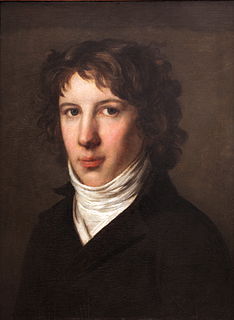A Quote by Louis Antoine de Saint-Just
The legislator commands the future; to be feeble will avail him nothing: it is for him to will what is good and to perpetuate it; to make man what he desires to be: for the laws, working upon the social body, which is inert in itself, can produce either virtue or crime, civilized customs or savagery.
Related Quotes
There are three points of doctrine the belief of which forms the foundation of all morality. The first is the existence of God; the second is the immortality of the human soul; and the third is a future state of rewards and punishments. Suppose it possible for a man to disbelieve either of these three articles of faith and that man will have no conscience, he will have no other law than that of the tiger or the shark. The laws of man may bind him in chains or may put him to death, but they never can make him wise, virtuous, or happy.
Surrender your will to Him. Unconditionally. Withhold nothing. Turn it all over to Him; all of your desires, wishes, dreams and hopes. Trust in Him. Trust Him who knows all things. Trust Him who has all power. Trust Him whose love for you is perfect. Trust Him, who alone suffered, paid, and atoned for you sins, and for your weaknesses as well. Trust Him that He will make of you immeasurably more than what you will ever, ever, in all eternity make of yourself. He will create of you a masterpiece. You will create of you only a smudge. You will create an ordinary man. He will create a God.
Let a man choose what condition he will, and let him accumulate around him all the goods and gratifications seemingly calculated to make him happy in it; if that man is left at any time without occupation or amusement, and reflects on what he is, the meagre, languid felicity of his present lot will not bear him up. He will turn necessarily to gloomy anticipations of the future; and unless his occupation calls him out of himself, he is inevitably wretched.
If a man gives way to all his desires, or panders to them, there will be no inner struggle in him, no 'friction,' no fire. But if, for the sake of attaining a definite aim, he struggles with desires that hinder him, he will then create a fire which will gradually transform his inner world into a single whole.
The mechanism that directs government cannot be virtuous, because it is impossible to thwart every crime, to protect oneself from every criminal without being criminal too; that which directs corrupt mankind must be corrupt itself; and it will never be by means of virtue, virtue being inert and passive, that you will maintain control over vice, which is ever active: the governor must be more energetic than the governed.
There's nothing to stop a man from writing unless that man stops himself. If a man truly desires to write, then he will. Rejection and ridicule will only strengthen him. And the longer he is held back the stronger he will become, like a mass of rising water against a dam. There is no losing in writing, it will make your toes laugh as you sleep, it will make you stride like a tiger, it will fire the eye and put you face to face with death. You will die a fighter, you will be honored in hell. The luck of the word. Go with it, send it.
The mind commands the body, and it obeys forthwith; the mind commands itself, and is resisted. The mind commands the hand to be moved, and such readiness is there that the command is scarce to be distinguished from the obedience. Yet the mind is mind, and the hand is body. The mind commands the mind to will, and yet, though it be itself, it obeyeth not. Whence this monstrous thing? and why is it?
For it is an absurdity to call a country civilized in which a decent and industrious man, laboriously mastering a trade which is valuble and necessary to the common weal, has no assurance that it will sustain him while he stands ready to practice it, or keep him out of the poorhouse when illness or age makes him idle.
In some inland post feel the savagery, the utter savagery, had closed round him--all that mysterious life of the wilderness that stirs in the forest, in the jungles, in the hearts of wild men. There's no initiation either into such mysteries. He has to live in the midst of the incomprehensible, which is detestable. And it has a fascination, too, which goes to work upon him. The fascination of the abomination--you know. Imagine the growing regrets, the longing to escape, the powerless disgust, the surrender, the hate.


































